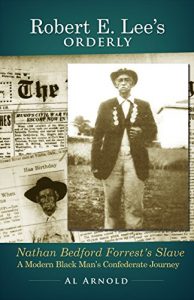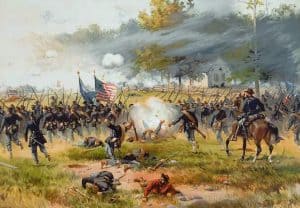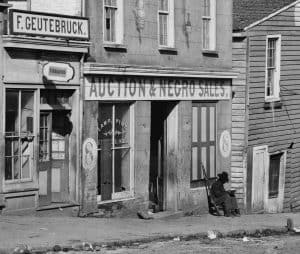Does the fact the General fought for the Confederacy keep us from learning any positive lessons from him? And if it does, what have we lost? And whose fault is it that we have lost it?
A nation which does not remember what it was yesterday does not know where it is today.
—Robert E. Lee—
Key points: Simplistic interpretations of historical events and personalities deprive us of rich and rewarding lessons. We therefore must approach history with an appreciation for its multi-layered complexities — and a willingness to understand them.
You can access all the articles in this series from this page.
Robert E. Lee is considered one of the greatest military generals of all time. He led the Confederate troops against the Union in the American Civil War. The South was fighting to preserve its way of life, which included slavery. The North fought to preserve the Union. Columbia University history professor Eric Foner cites military historian Gary W. Gallagher and his book The Union War in explaining northerners’ motivations for taking up arms against their Southern counterparts. Foner writes,
The Civil War, Gallagher announces at the outset, was “a war for Union that also killed slavery.” Emancipation was an outcome (an “astounding” outcome, Lincoln remarked in his second Inaugural Address) but, Gallagher insists, it always “took a back seat” to the paramount goal of saving the Union. Most Northerners, he says, remained indifferent to the plight of the slaves. They embraced emancipation only when they concluded it had become necessary to win the war. They fought because they regarded the United States as a unique experiment in democracy that guaranteed political liberty and economic opportunity in a world overrun by tyranny. Saving the Union, in the words of Secretary of State William H. Seward, meant “the saving of popular government for the world.”
 Thus, the idea that northerners in general were primarily concerned about the dignity and worth of slaves is a common myth. Of course, some were; but what Professor Foner and Gary Gallagher contend aligns with the findings of Al Arnold, a great-great grandson of a slave who “served in the Confederate army as an orderly for two Confederate soldiers and Robert E. Lee.”1 The man’s name was Turner Hall, Jr., and he was “was owned by another prominent Civil War general, Nathan Bedford Forrest.”2 Arnold, who has done extensive research regarding the Civil War and his ancestor’s role in it, writes this about President Lincoln and the North:
Thus, the idea that northerners in general were primarily concerned about the dignity and worth of slaves is a common myth. Of course, some were; but what Professor Foner and Gary Gallagher contend aligns with the findings of Al Arnold, a great-great grandson of a slave who “served in the Confederate army as an orderly for two Confederate soldiers and Robert E. Lee.”1 The man’s name was Turner Hall, Jr., and he was “was owned by another prominent Civil War general, Nathan Bedford Forrest.”2 Arnold, who has done extensive research regarding the Civil War and his ancestor’s role in it, writes this about President Lincoln and the North:
Contrary to what many African Americans believe, Abraham Lincoln did as much as he could to stabilize slavery in the southern states as any Southerner. Moreover, slaves were not welcomed in the North. White Northerners during the war were often more racist than Southerners toward blacks.…3

[Furthermore, m]any of the Union generals had no tolerance for Negros. General [William] Tecumseh Sherman in particular had a strong disdain for the Negro. Any serious student of history knows that Lincoln used the issue of slavery as a prop to lure the southern states back into the Union. His primary goal was to preserve the Union, not to free the slaves. Had he had his way, the South could have kept their slaves. Lincoln was not a member of the Radical Republicans that promoted the Civil War as an end to slavery. Yet, we don’t see this version of Lincoln portrayed in the 2012 movie, Lincoln. We see him as the great deliverer of the slave. African Americans did not hesitate to support this movie nor did they protest Lincoln’s pro Southern views. Should we remove Abraham Lincoln’s portrait from the five-dollar bill? If we follow the logic of some modern African Americans to remove every vestige and symbol of those who supported slavery we would have to destroy the North much as the north destroyed the South during the Civil War. Is that a logical thing to do? Is that an absurd thought? Of course it is illogical to think this way.4
Mr. Arnold reminds us that history is multi-layered and complex. It cannot be accurately understood through the lens of a single issue, even one that was important in the time period the history student is exploring. Moreover, history cannot be properly interpreted if no effort is made to understand culture of the day. “Revisionist history,” says Arnold, “is taking your time horizon and historical perspective and applying it to the lens of time and history of a different era.…[R]emoving the original historical context from an object, position, or time and applying a new historical context that is specific to your time period is an incorrect way of interpreting” the events of the past.5
Sometimes, even some of the clearest and most obvious information can give us insights into what happened and why. For starters, knowing some of the differences between the North and South, and between their respective cultures, can help us better understand the War Between the States. Here is a brief article highlighting a few of those differences.
Revisionist history is taking your time horizon and historical perspective and applying it to the lens of time and history of a different era. It is an incorrect way of interpreting history.
—Al Arnold—

John J. Dwyer is an author and historian who has written extensively about the War Between the States. His works include two historical novels, Stonewall (B&H Publishing, 1998) and Robert E. Lee (B&H Publishing, 2002). In a special note to readers on the final pages of Stonewall, Dwyer warns about (1) the tendency of modern observers to bring their own prejudices to their interpretations of history, and (2) the agendas of crusaders of political correctness to influence people’s perceptions and interpretations of past events. You can read a portion of Dwyer’s message to his readers here.
So, You Think You Would Have Paddled Upstream Against Society? Think Again!

Before leaving the matter of how our own culture affects our perceptions of history, we need to explore at least one more aspect of this. Our culture and the prevailing cultural narrative leave their mark on us far more than we realize. Much of this influence — probably most of it — is under the radar. It’s very easy for us to look at an issue that divided people in the past and imagine we would have made “right” decision, even though we can’t even begin to understand all the contrary influences we would have faced had we actually lived during that time and in that culture. Princeton Professor Robert P. George illustrated this vividly in July of 2020 in a series of tweets that went viral. He essentially gave his students a quiz.
-
-
- 1/ I sometimes ask students what their position on slavery would have been had they been white and living in the South before abolition. Guess what? They all would have been abolitionists! They all would have bravely spoken out against slavery, and worked tirelessly against it.
- 2/ Of course, this is nonsense. Only the tiniest fraction of them, or any of us, would have spoken up against slavery or lifted a finger to free the slaves. Most of them—and us—would have gone along. Many would have supported the slave system and happily benefited from it.
- 3/ So I respond by saying that I will credit their claims if they can show evidence of the following: that in leading their lives today they have stood up for the rights of unpopular victims of injustice whose very humanity is denied, and where they have done so knowing:
- 4/ (1) that it would make them unpopular with their peers, (2) that they would be loathed and ridiculed by powerful, influential individuals and institutions in our society; (3) that they would be abandoned by many of their friends, (4) that they would be called nasty names and
- 5/ (5) that they would risk being denied valuable professional opportunities as a result of their moral witness. In short, my challenge is to show where they have at risk to themselves and their futures stood up for a cause that is unpopular in elite sectors of our culture today.
-
How would you have performed on Dr. George’s pop test?
Revisionist History Is Dangerous — and Widespread

Of course, all Americans can and should rejoice that slavery is a thing of the past. No one in his right mind wishes it had survived. At the same time (as I have indicated), if we are going to accurately understand the American Civil War and the principal players in it, we need to jettison the ideas that everyone fighting for the Union was a friend to blacks and that everyone fighting for the Confederacy was a racist. Confederate General Robert E. Lee actually considered slavery an evil. After the war, he said,
So far from engaging in a war to perpetuate slavery, I am rejoiced that Slavery is abolished. I believe it will be greatly for the interest of the South. So fully am I satisfied of this that I would have cheerfully lost all that I have lost by the war, and have suffered all that I have suffered to have this object attained.
In part 2, we will learn more about Confederate General Robert E. Lee, as well as the man Robert E. Lee. To the surprise of some, we will find he had numerous qualities that (despite the general’s fighting to preserve a way of life that included slavery) are admirable and worthy of emulating.
Stay tuned! I plan to release Part 2 within a few days.
Copyright © 2021 by B. Nathaniel Sullivan. All rights reserved.
Notes:
1Al Arnold. Robert E. Lee’s Orderly: A Modern Black Man’s Confederate Journey . Publish Green. Kindle Edition. (The quoted statement appears in the “About the Author” section, at location 102.)
2Ibid.
3Al Arnold, location 299.
4Al Arnold, locations 310-325.
5Al Arnold, location 469.

I truly regret that it has taken me this long to read this article! It is so well written and our educational system and society in general would be so much better if it were taught and practiced! (I have added the entire series to my reading list.)
Thank you, David! Your interest in history has inspired me and encouraged me to increase mine. Blessings to you! — Bev Sullivan